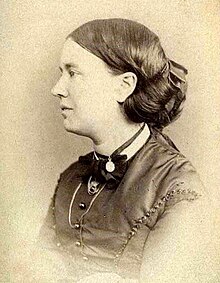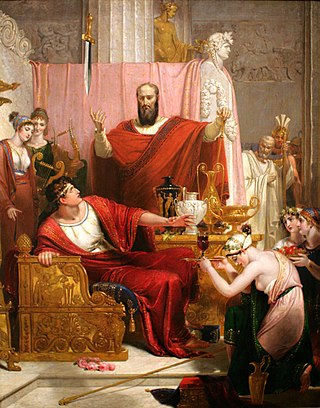
Damocles is a character who appears in a anecdote commonly referred to as "the sword of Damocles", an allusion to the imminent and ever-present peril faced by those in positions of power. Damocles was a courtier in the court of Dionysius I of Syracuse, a ruler of Syracuse, Sicily, Magna Graecia, during the classical Greek era.

Lü Dongbin is a legendary Chinese scholar and poet who lived during the Tang dynasty whose lifetime supposedly spanned two hundred and twenty years. Elevated to the status of an immortal in the Chinese cultural sphere by Daoists, he is one of the most widely known of the group of deities known as the Eight Immortals. Lü is also a historical figure and mentioned in the official history book History of Song. He is widely considered to be one of the earliest masters of neidan, or internal alchemy. He is also depicted in art dressed as a scholar carrying a sword to dispel evil spirits.

Jean Ingelow was an English poet and novelist, who gained sudden fame in 1863. She also wrote several stories for children.

The Metamorphoses of Apuleius, which Augustine of Hippo referred to as The Golden Ass, is the only ancient Roman novel in Latin to survive in its entirety.
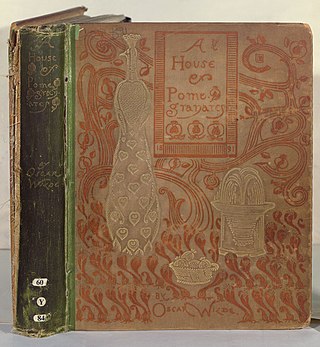
A House of Pomegranates is a collection of fairy tales written by Oscar Wilde published in 1891 as a second collection for The Happy Prince and Other Tales (1888). Wilde once said that this collection was "intended neither for the British child nor the British public".
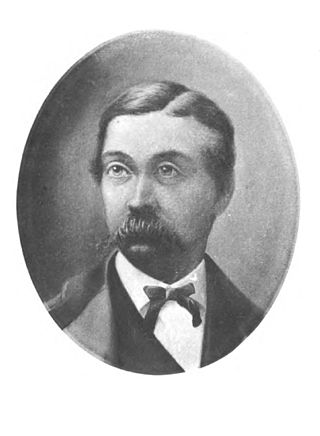
Fitz-James O'Brien was an Irish-American writer of works in fantasy and science fiction short stories. His career was marked by a significant contribution to the American literary scene in the mid-19th century.
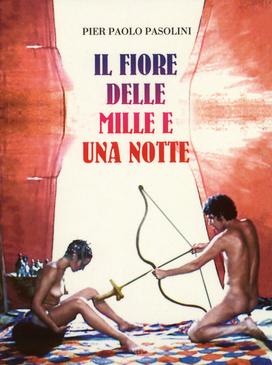
Arabian Nights is a 1974 Italian film directed by Pier Paolo Pasolini. Its original Italian title is Il fiore delle mille e una notte, which means The Flower of the One Thousand and One Nights.
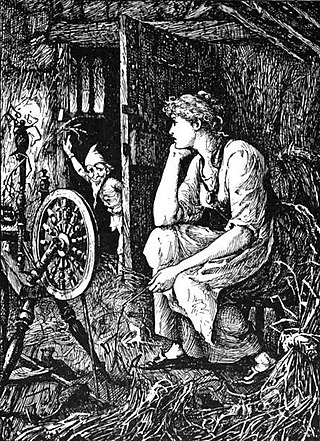
The Langs' Fairy Books are a series of 25 collections of true and fictional stories for children published between 1889 and 1913 by Andrew Lang and his wife, Leonora Blanche Alleyne. The best known books of the series are the 12 collections of fairy tales also known as Andrew Lang's "Coloured" Fairy Books or Andrew Lang's Fairy Books of Many Colors. In all, the volumes feature 798 stories, besides the 153 poems in The Blue Poetry Book.

"Through the Gates of the Silver Key" is a short story co-written by American writers H. P. Lovecraft and E. Hoffmann Price between October 1932 and April 1933. A sequel to Lovecraft's "The Silver Key", and part of a sequence of stories focusing on Randolph Carter, it was first published in the July 1934 issue of Weird Tales.
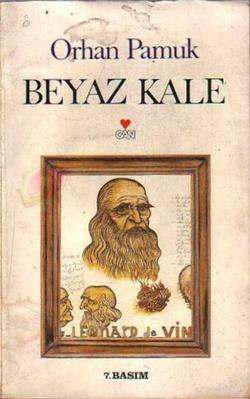
The White Castle is a novel by Turkish writer Orhan Pamuk.
The Mound is a horror/science fiction novella by American author H. P. Lovecraft, written by him as a ghostwriter from December 1929 to January 1930 after he was hired by Zealia Bishop to create a story about a Native American mound which is haunted by a headless ghost. Lovecraft expanded the story into a tale about a mound that conceals a gateway to a subterranean civilization, the realm of K'n-yan. The story was not published during Lovecraft's lifetime. A heavily abridged version was published in the November 1940 issue of Weird Tales, and the full text was finally published in 1989.
"The Three Sisters" or Green Meadow is an Italian literary fairy tale written by Giambattista Basile in his 1634 work, the Pentamerone. It tells the story of a maiden having secret encounters with a prince with the use of magic, him almost losing his life and her having to search for a cure for him.
African-American folktales are the storytelling and oral history of enslaved African Americans during the 1700s–1900s. Prevalent themes in African-American folktales include tricksters, life lessons, heartwarming tales, and slavery. African Americans created folktales that spoke about the hardships of slavery and told stories of folk spirits that could outwit their slaveholders and defeat their enemies. These folk stories gave hope to enslaved people that folk spirits would liberate them from slavery.
The Green Snake and the Beautiful Lily is a fairy tale by Johann Wolfgang von Goethe published in 1795 in Friedrich Schiller's German magazine Die Horen. It concludes Goethe's novella rondo Conversations of German Emigrants (1795). Das Märchen is regarded as the founding example of the genre of Kunstmärchen, or artistic fairy tale. The story revolves around the crossing and bridging of a river, which represents the divide between the outer life of the senses and the ideal aspirations of the human being.

The Claidi Journals is a fantasy novel quartet by British writer Tanith Lee. It includes Law of the Wolf Tower (1998); Wolf Star Rise (2000); Queen of the Wolves (2001); and Wolf Wing (2002). An omnibus volume of the first three novels was released in 2003.

Beauty and the Beast is a 1987 English-language Israeli musical film, part of the 1980s film series Cannon Movie Tales. It is a contemporary adaptation of the classic tale of Beauty and the Beast by Jeanne-Marie Leprince de Beaumont, borrowing elements from Villeneuve's version, such as the dream sequences. The film was shot entirely in Israel, and the taglines were: "The monster they feared was the prince she loved" and "The classic fairy tale about seeing with your heart".
"The Stranger" is the 20th episode of the American fairy tale/drama television series Once Upon a Time, which aired in the United States on ABC on April 29, 2012.

"A Lost Wand" is a fairy tale written by Jean Ingelow. It was first published in 1872 as part of The Little Wonder Horn, and later republished as one of the stories in Wonder-Box Tales in 1902. The story revolves around Hulda, a lucky young girl in Norway who receives the opportunity to be granted a wish after finding a ring in her slice of cake.

Walking Wounded is a collection of short stories written by William McIlvanney and published in 1 January 1989. Following a revival of interest in McIlvanney's writing, this book was reissued by Canongate Books in 2014.

"Souls of the Departed" is the twelfth episode and midseason premiere of the fifth season of the American fantasy drama series Once Upon a Time, which aired on March 6, 2016. This episode also acts as the series' 100th.

